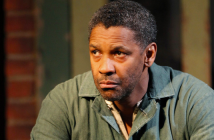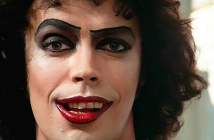Two years ago at SXSW, I ventured with my then-girlfriend and one of my peers into a Samsung virtual reality booth. The line was very long, but it was ultimately worth the wait. Once inside, we were given access to VR headset where a variety of immersive content (scary houses, helicopter rides, a zip line ride over Vegas) was made available to us for our enjoyment. It was incredible to see this technology at work, but I couldn’t help but wonder if this was one of the next steps for movies.
The following year, I had to bow out of attending SXSW save for one day I happened to be in town for wedding planning purposes and was able to catch two movies. I missed out on a lot of exciting movies, but one that particularly caught my eye was Alex Oshmyansky’s Career Opportunities in Organized Crime. It’s incredibly catchy title aside, I was drawn in by the fact that press releases for the film boasted that it was the first feature-length virtual reality film. Based on what admittedly little I knew about virtual reality, I was excited to see just what a virtual reality movie would look like.
Some months later, I was thrilled to be given the opportunity to finally experience Alex’s movie. Career Opportunities in Organized Crime is an extremely entertaining film, a faux-documentary that chronicles the filming of a recruitment video for the Russian mafia.
Oshmyansky was kind enough to talk with me about the film. A doctor by day, his schedule was rather hectic, but we were able to communicate through email.
Daniel Tucker: One of the first spoken lines in the movie is “if you’re watching this, it means you are very special.” Whether it was intended or not, I applied that to the film as a whole. As the director of the first feature-length VR film, could you chart your journey for me? What made you want to undertake this project, and with this particular approach?
Alex Oshmyansky: I’ve loved film ever since I was a small child, basically as long as I’ve had memory. I made shorts as a teenager, and always wanted to make full feature film. About 18 months ago, I was reading about the new generation of virtual reality technology and its application to filmmaking. I figured somebody must have already made a full feature length movie in VR, but when I saw nobody had, I decided basically immediately that I had to do it. It was just too cool. After about 3 month of pre-production, we filmed the movie in about 2 weeks, and then spent the remainder of our time up until our premiere working on post-production, which is pretty intense in VR as every frame is basically a VFX shot.
DT: Why did you choose this particular subject matter?
AR: I really like the mocku-mentary genre, and had the idea a long time ago for a workplace satire based on the Russian mafia. I also thought a gangster picture would be a good first film for VR. The film (very) loosely follows a similar plot to the classic James Cagney movie “The Public Enemy,” and I tried to put a bunch of kind of subtle nods to classic 1930s gangster movies throughout the movie.
DT: There’s a surprising amount of humor in this film, though the poster and the title could suggest otherwise. Could you talk a bit how important it was to you have humor in the script?
AR: I really like humor (though perhaps if I liked it more sincerely, I’d probably put I joke in here somewhere). I wanted the VR picture not to take itself too seriously, as we are sort of playing with a new medium. Hopefully the jokes play in VR!
DT: A healthy chunk of cinema’s language has been defined by the rule that the camera, no matter how wide the lens, can only show 180 degrees. In a way, you had to invent your own language and rules to make this project. Could you talk about how having 360 degrees to work with affected the way you approached blocking and setting up a shot?
AR: It does add a fair number more elements to think about. You as a director can’t really tell an audience member where to look, but, kind of like in the theater, have to sort of encourage them to look in the right direction where the major story events are taking place. At the same time, you don’t want to keep all the action always just straight ahead as that takes away some of the fun of VR. Mapping out a scene like that in 360-degrees just makes the thinking that goes into it different. Also, production design tends to be a lot more challenging as suddenly you have to dress a set for every possible camera angle!
DT: Were there any movies or filmmakers in particular that you studied to help you with this project?
AR: Specifically VR filmmakers like Chris Milk, Félix Lajeunesse, and Paul Raphaël were really important to look to as they did a lot of trailblazing work in VR. In the world of conventional film, the film took a lot from the mocku-mentaries of Rob Reiner and well as gangster films like Godfather and Scarface.
DT: What was SXSW like for you? What is it like to show this kind of film to an audience and get feedback as a filmmaker?
AR: It was really incredible to get to show the film there! SXSW is a really incredible creative venue. However, it’s was really nerve-wracking to show a film for the first time and anticipate the feedback. It was incredibly valuable though to see the audience response. It’s a lot of fun to watch people’s faces light up when the experience the VR for the first time.
DT: What are some movies or genres that you would like to see get the VR treatment?
AR: I think Sci-Fi movies will be fantastic in VR once VR filmmaking really takes off. Documentaries as well. The VR equipment can be surprisingly portable and take you anywhere in the world!
DT: Has the filmmaking bug bit you now? What can we expect from you in the future? Will it be VR or “traditional” film?
AR: Definitely. We have a VR documentary in production now in Iraq set on the frontline with ISIS and more to come after that!
Career Opportunities in Organized Crime is now available for download digitally or through smartphones (iOS, Android) and desktop, via Reelhouse.org.




